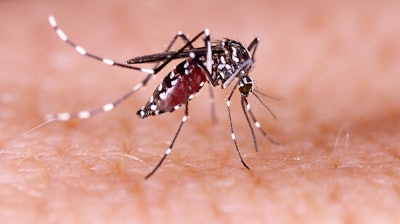
GEORGE TOWN, Cayman Islands (AP) — The first wave of genetically modified mosquitoes were released Wednesday in the Cayman Islands as part of a new effort to control the insect that spreads Zika and other viruses, officials in the British Island territory said.
Genetically altered male mosquitoes, which don't bite but are expected to mate with females to produce offspring that die before reaching adulthood, were released in the West Bay area of Grand Cayman Island, according to a joint statement from the Cayman Islands Mosquito Research and Control Unit and British biotech firm Oxitec.
The mosquitoes will be released over nine months in an area known to be a hot spot for the Aedes aegypti species, which are not native to the Cayman Islands and are the main vector for Zika as well as other viruses, including chikingunya and dengue.
The project had been scheduled in June but the release was postponed first by a delay in getting an occupancy permit for the lab in which mosquitoes are bred and then by a court challenge from opponents who argued that the government had not provided sufficient information about potential risks or adequately studied other alternatives. A judge ruled Tuesday that the effort could proceed.
Oxitec has deployed its mosquitoes to fight Zika in Brazil following initial trials there and previously conducted tests in the Cayman Islands and Panama. Oxitec and officials in the Florida Keys have proposed testing there as well and are awaiting U.S. regulatory approval.






















